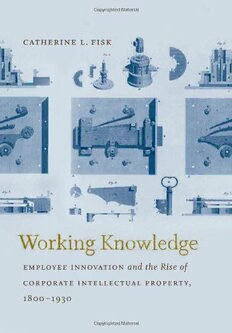Download Working Knowledge: Employee Innovation and the Rise of Corporate Intellectual Property, 1800-1930 PDF Free - Full Version
Download Working Knowledge: Employee Innovation and the Rise of Corporate Intellectual Property, 1800-1930 by Catherine L. Fisk in PDF format completely FREE. No registration required, no payment needed. Get instant access to this valuable resource on PDFdrive.to!
About Working Knowledge: Employee Innovation and the Rise of Corporate Intellectual Property, 1800-1930
Skilled workers of the early nineteenth century enjoyed a degree of professional independence because workplace knowledge and technical skill were their "property," or at least their attribute. In most sectors of today's economy, however, it is a foundational and widely accepted truth that businesses retain legal ownership of employee-generated intellectual property. In Working Knowledge, Catherine Fisk chronicles the legal and social transformations that led to the transfer of ownership of employee innovation from labor to management. This deeply contested development was won at the expense of workers' entrepreneurial independence and ultimately, Fisk argues, economic democracy.By reviewing judicial decisions and legal scholarship on all aspects of employee-generated intellectual property and combing the archives of major nineteenth-century intellectual property-producing companies--including DuPont, Rand McNally, and the American Tobacco Company--Fisk makes a highly technical area of law accessible to general readers while also addressing scholarly deficiencies in the histories of labor, intellectual property, and the business of technology.
Detailed Information
| Author: | Catherine L. Fisk |
|---|---|
| Publication Year: | 2009 |
| ISBN: | 9780807833025 |
| Pages: | 373 |
| Language: | English |
| File Size: | 2.657 |
| Format: | |
| Price: | FREE |
Safe & Secure Download - No registration required
Why Choose PDFdrive for Your Free Working Knowledge: Employee Innovation and the Rise of Corporate Intellectual Property, 1800-1930 Download?
- 100% Free: No hidden fees or subscriptions required for one book every day.
- No Registration: Immediate access is available without creating accounts for one book every day.
- Safe and Secure: Clean downloads without malware or viruses
- Multiple Formats: PDF, MOBI, Mpub,... optimized for all devices
- Educational Resource: Supporting knowledge sharing and learning
Frequently Asked Questions
Is it really free to download Working Knowledge: Employee Innovation and the Rise of Corporate Intellectual Property, 1800-1930 PDF?
Yes, on https://PDFdrive.to you can download Working Knowledge: Employee Innovation and the Rise of Corporate Intellectual Property, 1800-1930 by Catherine L. Fisk completely free. We don't require any payment, subscription, or registration to access this PDF file. For 3 books every day.
How can I read Working Knowledge: Employee Innovation and the Rise of Corporate Intellectual Property, 1800-1930 on my mobile device?
After downloading Working Knowledge: Employee Innovation and the Rise of Corporate Intellectual Property, 1800-1930 PDF, you can open it with any PDF reader app on your phone or tablet. We recommend using Adobe Acrobat Reader, Apple Books, or Google Play Books for the best reading experience.
Is this the full version of Working Knowledge: Employee Innovation and the Rise of Corporate Intellectual Property, 1800-1930?
Yes, this is the complete PDF version of Working Knowledge: Employee Innovation and the Rise of Corporate Intellectual Property, 1800-1930 by Catherine L. Fisk. You will be able to read the entire content as in the printed version without missing any pages.
Is it legal to download Working Knowledge: Employee Innovation and the Rise of Corporate Intellectual Property, 1800-1930 PDF for free?
https://PDFdrive.to provides links to free educational resources available online. We do not store any files on our servers. Please be aware of copyright laws in your country before downloading.
The materials shared are intended for research, educational, and personal use in accordance with fair use principles.

